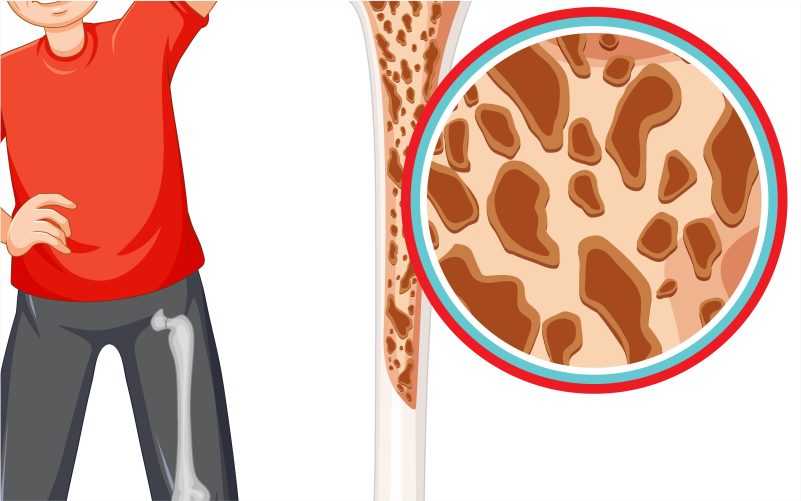Osteoporosis
Osteoporosis is a condition characterized by low bone density and deterioration of bone tissue, leading to an increased risk of fractures. It primarily affects older individuals, especially women after menopause.
Here’s an overview of osteoporosis and its treatment:

Lifestyle Modifications
Lifestyle changes play a crucial role in managing osteoporosis and preventing further bone loss. These may include:
Calcium and Vitamin D
Consuming an adequate amount of calcium and vitamin D is essential for bone health. A balanced diet with calcium-rich foods (such as dairy products, leafy green vegetables, and fortified foods) and exposure to sunlight for vitamin D synthesis are recommended. Supplements may be prescribed if dietary intake is insufficient.
Exercise
Regular weight-bearing exercises like walking, jogging, dancing, and resistance training help strengthen bones and improve overall bone health. Balance and posture exercises can also help prevent falls, which can lead to fractures.
Fall Prevention
Taking precautions to prevent falls, such as removing tripping hazards, using handrails, and wearing appropriate footwear, is crucial for individuals with osteoporosis.
Medications
Several medications are available to prevent further bone loss, increase bone density, and reduce the risk of fractures. These may include:
Bisphosphonates
Medications like alendronate, risedronate, and ibandronate help slow down bone loss and reduce fracture risk. They are commonly prescribed for osteoporosis treatment.
Hormone Therapy
Estrogen or hormone therapy may be recommended for postmenopausal women to help preserve bone density. However, the decision to use hormone therapy is based on an individual’s unique situation and should be discussed with a healthcare provider.
Selective Estrogen Receptor Modulators (SERMs)
Medications like raloxifene act like estrogen in some parts of the body, helping to maintain bone density and reduce the risk of fractures.
Denosumab
Denosumab is an injectable medication that inhibits bone breakdown and can help improve bone density in individuals with osteoporosis.
Fall Prevention Strategies
Preventing falls is essential for individuals with osteoporosis, as fractures can have severe consequences. Some strategies include modifying the home environment, using assistive devices if needed (such as canes or walkers), and regular eye exams to ensure optimal vision.
Treatment plans for osteoporosis are individualized and based on factors such as age, sex, fracture risk, and overall health. It’s important to consult with a healthcare provider, such as an endocrinologist or rheumatologist, who specializes in bone health and osteoporosis management. Regular bone density tests and monitoring are necessary to assess the effectiveness of treatment and adjust the management plan as needed.







